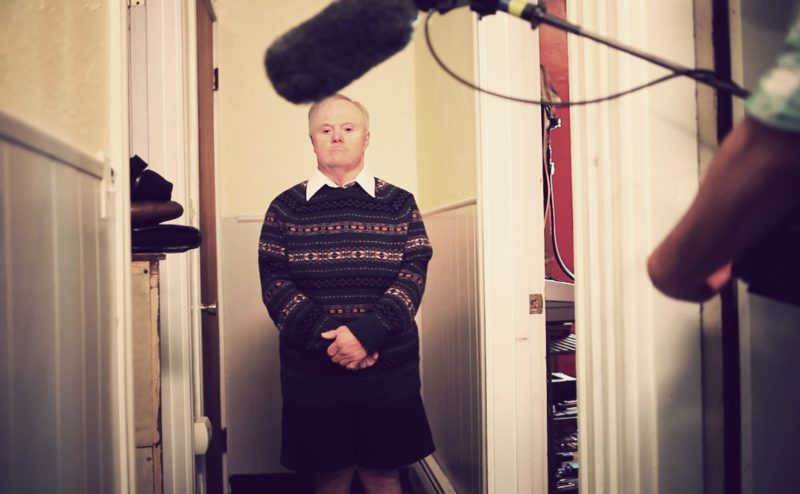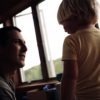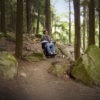
Filmmaking | Interviews | Massachusetts
Interview with Filmmaker Michael Parks Randa about ‘The Perfect Buddy’
Written by NewEnglandFilm.com | Posted by: NewEnglandFilm.com
Lead actor Bobby Bird in The Perfect Buddy has Down’s syndrome. And it turns out, that fact has nothing to do with the plot of the movie — quite deliberately. Filmmaker Michael Parks Randa talks about his inspiration for the film, his relationship with Bird, and his future work. The Perfect Buddy is currently screening online as part of the 2014 Online New England Film Festival.
When did you know you wanted to become a filmmaker? And how did you learn — did you just start doing it, did you go to film school?
I started out making films at a young age mainly for school projects to get out of writing term papers. My friends and I would make really shitty Scream knock-offs in middle school at sleepovers that were just made for our own enjoyment. I never really considered being a filmmaker until mid-way through college when I started making music videos for my friends’ band State Radio. I started taking editing and production classes and decided to declare as a Media Studies major. I won a couple of awards for my music videos on campus and thought it might be worth pursuing, and I’ve been working as a filmmaker/director/editor/producer ever since.
What inspired you to make your film?
With The Perfect Buddy I thought it would be interesting to make a film where the protagonist is played by an actor with a disability, but that within the film his disability is completely irrelevant. Actors with disabilities can never seem to shake the emphasis being on their disability in roles, and I’ve always found that to be unfair.
In The Perfect Buddy Brian Higgins could be played by an elderly, able-bodied individual just as well. No part of the character hinges on the fact that Bobby has down syndrome or a speech impediment. I was interested in the idea of making a film where the viewer recognizes that the lead has a disability, but can’t pinpoint the relevance in the film, hopefully concluding that there is none. I think The Perfect Buddy accomplishes that.
People may give the film credit for including a person with disabilities, but I don’t think that’s why they enjoy it. If the film succeeds at all it’s due to Bobby Bird’s abilities and talents, rather than his disability. His charisma and humor on screen is why people seem to like the film.
People are naturally going to assume that the The Perfect Buddy intends to make a statement or has some sort of agenda by casting Bobby. The reality is that those involved in the film have a long and fruitful history with people with disabilities. My family has run a day program for young adults with a wide range of disabilities in Massachusetts for nearly 40 years. So having Bobby involved in the film was less a deliberate angle for the film, and more of a fun way to spend time with an old friend. If I hope The Perfect Buddy accomplishes anything it’s that people recognize that people with disabilities are capable of carrying roles in which their own personal disability is not a focus.
How did you find your cast and crew for this film?
I met Bobby Bird, the protagonist of The Perfect Buddy, when I was 18 in Los Angeles as part of a creative arts camp called Zeno Mountain Farm, a non-profit organization that is dedicated to celebrating the friendships between the able-bodied and disabled. We shot a short film for about two weeks out there and I quickly forged a life-long friendship with Bobby. I was later asked to help shoot a documentary series called How’s Your News?, which is a news program comprised of individuals with developmental disabilities. How’s Your News? was an HBO movie, political documentary, and aired as a pilot television series on MTV. My brother is a writer and the rest of the crew are made up of talented friends and fellow cinematographers/editors who I recruited for the film.
Where has the film been shown (festivals, other screenings, etc.)? Talk about a memorable experience with an audience?
The Perfect Buddy has primarily been screened online, though it was recently part of the Reelabilities Film Festival, which we were honored to be a part of. Bobby and I were the featured guests and spoke to the audience about the importance of disability inclusion in the creative arts. We fielded questions from the audience and shared some stories about the production. It was a trip, and we really enjoyed it.
What film(s) are you working on now?
My brother and I have been co-writing a film called The Wondrous Hockshop, which is a comedy starring Bobby and another friend with down syndrome named Sean Costello. They’re both extremely charismatic and endearing. The film follows these two down-on-their-luck amateur treasure hunters that travel town to town by railroad hand car digging in search of buried antiques that they sell at their curated flea market, The Wondrous Hockshop. With little to no interest in their beloved shop, they enter in various dance competitions to keep their business afloat.
Any advice on making films you want to share – about fundraising, working with actors, distributing, sending to festivals, etc?
Push the limits of your creative boundaries. Lean on your friends and family to help you accomplish your goals – they believe in you and want to help. Never stop learning about the advances in technology for filmmaking. It’s become easier and as inexpensive as ever to produce incredibly high-end films for very little. Take chances – there’s nothing wrong with a little reckless abandon to make your films come to life. I encourage it.
For more information about Randa’s work, see www.colliewoods.com.










